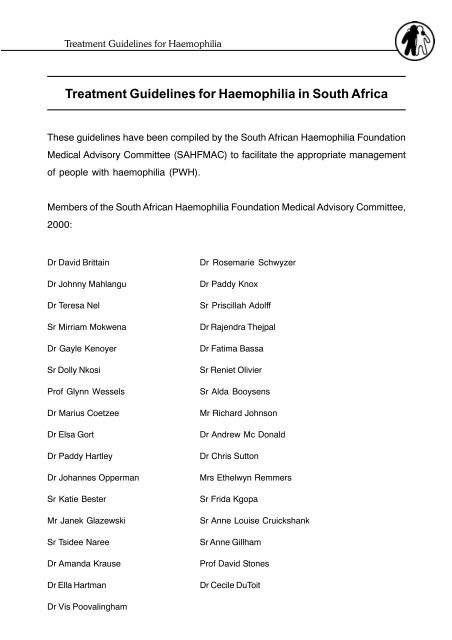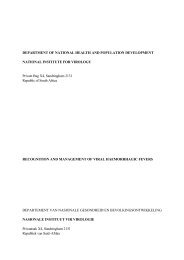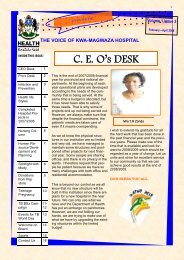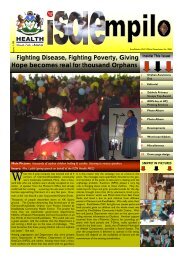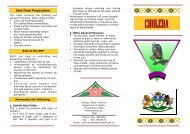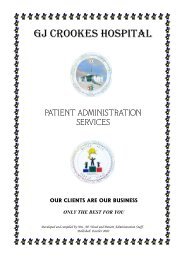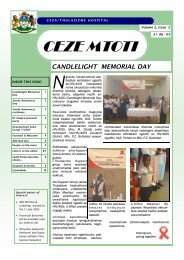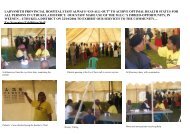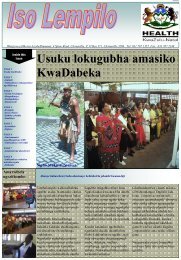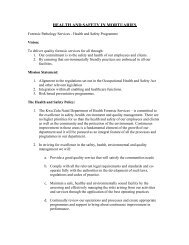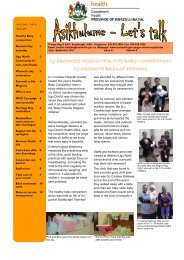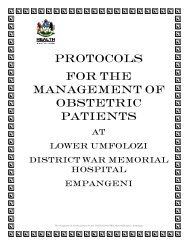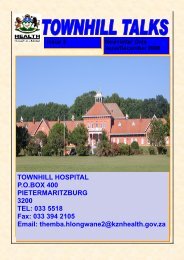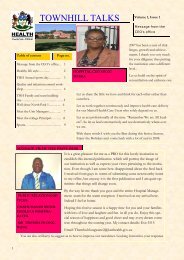Haemo Treatment Guidelines 2
Haemo Treatment Guidelines 2
Haemo Treatment Guidelines 2
You also want an ePaper? Increase the reach of your titles
YUMPU automatically turns print PDFs into web optimized ePapers that Google loves.
<strong>Treatment</strong> <strong>Guidelines</strong> for <strong>Haemo</strong>philia<br />
<strong>Treatment</strong> <strong>Guidelines</strong> for <strong>Haemo</strong>philia in South Africa<br />
These guidelines have been compiled by the South African <strong>Haemo</strong>philia Foundation<br />
Medical Advisory Committee (SAHFMAC) to facilitate the appropriate management<br />
of people with haemophilia (PWH).<br />
Members of the South African <strong>Haemo</strong>philia Foundation Medical Advisory Committee,<br />
2000:<br />
Dr David Brittain Dr Rosemarie Schwyzer<br />
Dr Johnny Mahlangu Dr Paddy Knox<br />
Dr Teresa Nel Sr Priscillah Adolff<br />
Sr Mirriam Mokwena Dr Rajendra Thejpal<br />
Dr Gayle Kenoyer Dr Fatima Bassa<br />
Sr Dolly Nkosi Sr Reniet Olivier<br />
Prof Glynn Wessels Sr Alda Booysens<br />
Dr Marius Coetzee Mr Richard Johnson<br />
Dr Elsa Gort Dr Andrew Mc Donald<br />
Dr Paddy Hartley Dr Chris Sutton<br />
Dr Johannes Opperman Mrs Ethelwyn Remmers<br />
Sr Katie Bester Sr Frida Kgopa<br />
Mr Janek Glazewski Sr Anne Louise Cruickshank<br />
Sr Tsidee Naree Sr Anne Gillham<br />
Dr Amanda Krause Prof David Stones<br />
Dr Ella Hartman Dr Cecile DuToit<br />
Dr Vis Poovalingham
<strong>Treatment</strong> <strong>Guidelines</strong> for <strong>Haemo</strong>philia
<strong>Treatment</strong> <strong>Guidelines</strong> for <strong>Haemo</strong>philia<br />
Table of Contents<br />
Note to Healthcare Personnel 1<br />
HAEMOPHILIA OVERVIEW 2<br />
TYPES OF BLEEDING IN HAEMOPHILIA 4<br />
Haemarthrosis 5<br />
Muscle & Soft Tissue Bleeding 6<br />
Head Injury - a Medical Emergency 7<br />
Dental / Gum Bleeding / Epistaxis / Tongue 8<br />
Gastrointestinal Bleeding 9<br />
Genito-urinary Bleeds 10<br />
TREATMENT OF BLEEDING EPISODES<br />
Factor VIII <strong>Treatment</strong> <strong>Guidelines</strong> 11<br />
Factor IX - <strong>Treatment</strong> <strong>Guidelines</strong> 12<br />
Factor VIII Inhibitor Management Options 13<br />
Rehabilitation Excercises After Joint or Muscle Bleeds 14<br />
Hepatitis 14<br />
<strong>Treatment</strong> <strong>Guidelines</strong> for Other Products 15<br />
<strong>Haemo</strong>philia <strong>Treatment</strong> Products Available in South Africa 16<br />
HAEMOPHILIA INFORMATION<br />
<strong>Haemo</strong>philia <strong>Treatment</strong> Centres and <strong>Haemo</strong>philia Treaters 17<br />
South African <strong>Haemo</strong>philia Foundations 20<br />
Notes<br />
Page
<strong>Treatment</strong> <strong>Guidelines</strong> for <strong>Haemo</strong>philia<br />
Note to Healthcare Personnel<br />
This booklet is intended as a guide for healthcare personnel who might not be familiar<br />
with haemophilia. Individuals with haemophilia and their physicians should be advised<br />
by a Comprehensive <strong>Haemo</strong>philia <strong>Treatment</strong> Centre staffed by a multidisciplinary team<br />
skilled in the care of this uncommon chronic bleeding disorder.<br />
Parents of patients with severe haemophilia are usually trained in home infusion of<br />
the clotting factor when their child is about four years old and self infusion is normally<br />
accomplished by 12 - 14 years of age. However, infants and boys with mild haemophilia<br />
must rely on a <strong>Haemo</strong>philia Centre or other medical facility for clotting factor infusions.<br />
Please contact Sr Anne Gillham or Sr Mirriam Mokwena (phone 011 787 6710; or<br />
cell phone 083 225 9850 or 082 896 3833) or your nearest <strong>Haemo</strong>philia <strong>Treatment</strong><br />
Centre if you have any uncertainty regarding management.<br />
Comprehensive <strong>Haemo</strong>philia <strong>Treatment</strong> Centres<br />
TOWN HOSPITAL PHYSICIAN PHONE<br />
Bloemfontein Universitas<br />
D. Stones / M.J. Coetzee 051 405 3911<br />
Cape Town Red Cross Children's F. Desai<br />
021 658 5297<br />
Durban Albert Luthuli R. Thejpal<br />
031 240 1536<br />
Johannesburg Johannesburg R. Schwyzer<br />
011 488 3294<br />
Polokwane Polokwane<br />
C. Sutton<br />
015 287 5043<br />
Port Elizabeth Dora Nginza<br />
R. Mitchel<br />
041 452 4107<br />
Pretoria Pretoria Academic J. Opperman<br />
012 354 5274<br />
Telephone numbers of other <strong>Haemo</strong>philia <strong>Treatment</strong> Centres in South Africa are listed<br />
on page 17.<br />
1
<strong>Treatment</strong> <strong>Guidelines</strong> for <strong>Haemo</strong>philia<br />
HAEMOPHILIA OVERVIEW<br />
<strong>Haemo</strong>philia is an inherited, x-linked, lifelong bleeding disorder which affects males<br />
almost exclusively. Most frequently haemorrhage involves joints or muscles.<br />
Bleeding patterns differ with age: infants usually bleed into soft tissues or from the<br />
mouth but as the boy grows, characteristic joint bleeding becomes more common.<br />
<strong>Haemo</strong>philia A is the most common form of haemophilia and is due to a deficiency<br />
of clotting factor VIII.<br />
<strong>Haemo</strong>philia B is due to a deficiency of clotting factor IX.<br />
Severity<br />
<strong>Haemo</strong>philia is classified as severe, moderate, or mild according to the levels of<br />
circulating factor VIII or IX and indicates the expected frequency of bleeding:<br />
• Severe:<br />
factor VIII or IX < 2%<br />
Factor VIII or IX replacement is needed<br />
several times per month for traumatic<br />
or apparently spontaneous bleeding.<br />
• Moderate:<br />
factor VIII or IX 2 - 5%<br />
Less frequent bleeding which usually<br />
follows trauma, surgery or dental work.<br />
• Mild:<br />
factor VIII or IX 5 - 25%<br />
Occasional bleeding, usually only<br />
after severe trauma or surgery.<br />
2
<strong>Treatment</strong> <strong>Guidelines</strong> for <strong>Haemo</strong>philia<br />
Factor VIII Inhibitors in <strong>Haemo</strong>philia<br />
Inhibitors may develop in 15 - 35% of persons with haemophilia A but are much less<br />
common in haemophilia B.<br />
Risk factors for the development of inhibitors:<br />
• severe haemophilia<br />
• family history of inhibitor development<br />
• more frequent in black patients<br />
If a child is going to develop an inhibitor, this usually happens within a few months<br />
after starting factor VIII replacement therapy.<br />
Inhibitors titres are measured in Bethesda units (BU)<br />
Low Responders: titre remains below 5 BU<br />
High Responders: titre above 5 - 10 BU. The level may increase markedly<br />
and rapidly after factor VIII infusion (may have rapid<br />
anamnestic response in 3 days)<br />
Rules for Inhibitor Management<br />
1. Monitor all patients every 3 - 6 months for the development of inhibitors. This<br />
is particularly important and should be done more frequently in newly<br />
diagnosed black children with severe haemophilia A, who are at greater risk.<br />
2. Never undertake a surgical procedure or joint aspiration in a person with<br />
haemophilia without checking for inhibitors.<br />
3. If there is no response to appropriate replacement therapy, test for inhibitors.<br />
4. Call a <strong>Haemo</strong>philia <strong>Treatment</strong> Centre for advice on patient management.<br />
Refer to page 13 for factor VIII inhibitor management options.<br />
3
<strong>Treatment</strong> <strong>Guidelines</strong> for <strong>Haemo</strong>philia<br />
Major bleeding episodes<br />
• Central nervous system<br />
• Gastrointestinal<br />
• Neck/throat<br />
• Severe injury<br />
• Hip or iliopsoas<br />
• Advanced joint/muscle<br />
• Forearm compartment<br />
Minor bleeding episodes<br />
• Joint (early)<br />
• Muscle/soft tissue<br />
• Mouth/gums<br />
• Epistaxis<br />
• Painless haematuria<br />
TYPES OF BLEEDING IN HAEMOPHILIA<br />
Important<br />
• May cause death or crippling.<br />
Advice should be sought from a<br />
<strong>Haemo</strong>philia <strong>Treatment</strong> Centre physician.<br />
• Start appropriate factor replacement<br />
urgently. Hospitalisation is usually<br />
required to maintain adequate factor<br />
levels.<br />
• If the patient has an inhibitor, the<br />
<strong>Haemo</strong>philia <strong>Treatment</strong> Centre must be<br />
consulted for major bleeding problems.<br />
Important<br />
• Although considered minor bleeds,<br />
complications may occur. If there are<br />
uncertainties about medical<br />
•<br />
management, consult a <strong>Haemo</strong>philia<br />
<strong>Treatment</strong> Centre.<br />
Treat early to avoid long term<br />
complications.<br />
4
<strong>Treatment</strong> <strong>Guidelines</strong> for <strong>Haemo</strong>philia<br />
Commonly affected joints<br />
Knees, elbows, ankles,<br />
(shoulder, hip and other joint<br />
bleeds are rare).<br />
Symptoms & Signs<br />
• Tingling sensation (early)<br />
Stiffness<br />
Pain<br />
Limited range of motion<br />
Swelling<br />
Limp or refusal to use limb<br />
<strong>Treatment</strong> <strong>Guidelines</strong><br />
Replace missing factor see:<br />
page 11 haemophilia A<br />
page 12 haemophilia B<br />
Rest the affected joint/limb<br />
posterior splint<br />
sling for arm<br />
no weight bearing<br />
Haemarthrosis<br />
• After one or several haemarthrosis with<br />
synovitis, a joint may become 'targeted'<br />
for recurrent bleeding and damage.<br />
• These patients should be referred for<br />
synovectomy<br />
• Do not delay treatment.<br />
Early bleeding can be felt by the patient<br />
before signs are apparent.<br />
Obvious joint swelling is a late sign of<br />
bleeding.<br />
• Treat early.<br />
Repeat infusions in 12 to 24 hours.<br />
• Ice packs may reduce bleeding:<br />
Apply 5 minutes on 10 minutes off.<br />
• No circumferential casting.<br />
• X-ray not indicated - only if fracture is<br />
suspected.<br />
5
<strong>Treatment</strong> <strong>Guidelines</strong> for <strong>Haemo</strong>philia<br />
Dangerous Areas<br />
• Forearm compartment<br />
• Neck/throat<br />
• Iliopsoas/retroperitoneal<br />
• Popliteal<br />
Symptoms & Signs<br />
Muscle tightness (early)<br />
Pain<br />
Swelling<br />
Limited range of motion<br />
Bruising<br />
Warmth<br />
Refusal to use limb<br />
(young child)<br />
<strong>Treatment</strong><br />
Replace missing factor refer to:<br />
page 11 haemophilia A<br />
page 12 haemophilia B<br />
Rest affected joint/limb<br />
posterior splint<br />
sling<br />
no weight bearing<br />
Muscle & Soft Tissue Bleeding<br />
• Aggressive treatment may be indicated.<br />
Consult a <strong>Haemo</strong>philia <strong>Treatment</strong> Centre<br />
for advice.<br />
• Hospitalisation may be required.<br />
Bruising may be absent with deep<br />
muscle bleeding.<br />
Muscle compartment bleeding (calf,<br />
forearm) may cause nerve damage or<br />
vascular compromise.<br />
Asymmetry of use or motion in the young<br />
child.<br />
• Treat early.<br />
Repeat infusions in 12 to 24 hours.<br />
Ice packs 5 minutes on, 10 minutes off.<br />
• No circumferential casting.<br />
6
<strong>Treatment</strong> <strong>Guidelines</strong> for <strong>Haemo</strong>philia<br />
History<br />
Minor head trauma can lead to<br />
CNS bleeding.<br />
Unrecognised trauma is common<br />
in children.<br />
'Spontaneous' bleeds can occur.<br />
Symptoms & Signs<br />
(onset may be delayed)<br />
Headache<br />
Vomiting<br />
Irritability/convulsions<br />
Lethargy/drowsiness<br />
Vision disturbance<br />
Focal neurologic deficits<br />
Ataxia<br />
<strong>Treatment</strong><br />
1. Urgent factor replacement -<br />
measure level and maintain<br />
above 50%. Refer to:<br />
page 11 haemophilia A<br />
page 12 haemophilia B<br />
2. CT scan of head<br />
3. Call a <strong>Haemo</strong>philia<br />
<strong>Treatment</strong> Centre<br />
Head Injury - a Medical Emergency<br />
Toddlers and young children are prone<br />
to head injury.<br />
Any of these with or without a history of<br />
trauma is highly suggestive of CNS bleeding.<br />
These are late features secondary to mass<br />
effect or brain irritation.<br />
NB: Symptoms may mimic a viral infection.<br />
If in doubt - treat<br />
• Factor replacement for possible<br />
subarachnoid bleeding is indicated even<br />
with a normal CT scan.<br />
• For proven intracranial bleeding<br />
treatment is required for 10 -14 days.<br />
7
<strong>Treatment</strong> <strong>Guidelines</strong> for <strong>Haemo</strong>philia<br />
Bleeding can be profuse<br />
Swallowing blood:<br />
vomiting blood<br />
dark tarry stools<br />
May need Hb and HCT<br />
<strong>Treatment</strong><br />
Dental / Gum Bleeding / Epistaxis / Tongue<br />
Replace missing factor refer to:<br />
page 11 haemophilia A<br />
page 12 haemophilia B<br />
Local pressure.<br />
Ice 5 minutes on, 10 minutes<br />
off.<br />
If tooth extracted use deep silk<br />
or Vicryl suture.<br />
Tranexamic acid may be useful<br />
(Refer to page 15).<br />
Red cell transfusion if<br />
necessary.<br />
Torn frenumlum (upper lip) bleeding is<br />
problematic in the young child.<br />
Dental injection or extraction requires<br />
prior infusion to raise factor levels.<br />
Cool, soft, or liquid diet following gum<br />
bleeding or dental extraction.<br />
8
<strong>Treatment</strong> <strong>Guidelines</strong> for <strong>Haemo</strong>philia<br />
Potential emergency<br />
Bleeding can be profuse<br />
Blood/coffee-ground<br />
emesis<br />
Dark/tarry stools<br />
<strong>Treatment</strong><br />
Immediate factor<br />
replacement refer to:<br />
page 11 haemophilia A<br />
page 12 haemophilia B<br />
Consult a <strong>Haemo</strong>philia<br />
<strong>Treatment</strong> Centre.<br />
Check BP, Hb & HCT.<br />
Gastrointestinal Bleeding<br />
Abdominal pain - regard as a bleed until<br />
proven otherwise: infuse factor first, then<br />
investigate as for all GIT bleeds.<br />
Hospitalise to maintain factor level and<br />
monitor ongoing blood loss.<br />
Investigate for site of bleeding.<br />
May need red cell transfusion.<br />
9
<strong>Treatment</strong> <strong>Guidelines</strong> for <strong>Haemo</strong>philia<br />
Usually spontaneous<br />
Signs & Symptoms<br />
May have renal angle<br />
tenderness<br />
Red or dark urine<br />
Usually no dysuria<br />
<strong>Treatment</strong><br />
Increase fluid intake<br />
(1 glass/hour)<br />
Bed rest<br />
If not resolved in 24 hours<br />
treat with factor replacement<br />
Refer to:<br />
page 11 haemophilia A<br />
Page 12 haemophilia B<br />
Continue to increase fluids and<br />
bed rest for 7 days<br />
Genito-urinary Bleed<br />
Persistent or recurrent haematuria should<br />
be investigated<br />
Tranexamic acid is contraindicated<br />
10
<strong>Treatment</strong> <strong>Guidelines</strong> for <strong>Haemo</strong>philia<br />
TREATMENT OF BLEEDING EPISODES<br />
Factor VIII replacement for <strong>Haemo</strong>philia A, no inhibitor<br />
Dose depends on bleeding severity<br />
Minor bleed: 15-25 IU/kg<br />
Major bleed: 40 IU/kg<br />
Expected response: 1 IU/kg = 2% rise in factor VIII level<br />
Half life Factor VIII: 8-12 hr<br />
Factor VIII <strong>Treatment</strong> <strong>Guidelines</strong><br />
Refer to page 16 for the products available in South Africa<br />
Always refer to the <strong>Haemo</strong>philia <strong>Treatment</strong> Centre physician’s<br />
instructions<br />
<strong>Treatment</strong> products may change: always read the package insert<br />
Patients with inhibitors require special treatment<br />
For serious bleeding factor VIII assay may be required to monitor the response to the<br />
infusion.<br />
If there is no response to appropriate replacement therapy, test for inhibitors.<br />
The <strong>Haemo</strong>philia <strong>Treatment</strong> Centre physician chooses the most<br />
suitable product for each patient. Please follow these<br />
recommendations.<br />
Plasma-derived factor VIII is treated with heat or solvent/detergent<br />
to inactivate viruses.<br />
Round off dose to the nearest vial; do not discard excess factor<br />
VIII but rather infuse it.<br />
Repeat doses may be required depending upon the severity of<br />
bleeding: Always needed for major bleeds every 12 - 24 hours.<br />
11
<strong>Treatment</strong> <strong>Guidelines</strong> for <strong>Haemo</strong>philia<br />
Factor IX replacement for <strong>Haemo</strong>philia B, no inhibitor<br />
Dose depends on bleeding severity<br />
Minor bleed: 15-20 IU/kg<br />
Major bleed: 40 IU/kg<br />
Expected response: 1 IU/kg = 1.5% rise in factor IX level<br />
Half life Factor IX: 16-24 hr<br />
Factor IX <strong>Treatment</strong> <strong>Guidelines</strong><br />
Refer to page 16 for the products available in South Africa<br />
Always refer to the <strong>Haemo</strong>philia <strong>Treatment</strong> Centre physician’s<br />
instructions<br />
<strong>Treatment</strong> products may change: always read the package insert<br />
Patients with inhibitors require special treatment<br />
For serious bleeding factor IX assay may be required to monitor the response to the<br />
infusion.<br />
If there is no response appropriate replacement therapy, test for inhibitors.<br />
The <strong>Haemo</strong>philia <strong>Treatment</strong> Centre physician chooses the most<br />
suitable product for each patient. Please follow these<br />
recommendations.<br />
Plasma-derived factor IX concentrates are treated with solvent/<br />
detergent to inactivate viruses.<br />
Factor IX Complex [Prothrombin complex concentrate (PCC)]<br />
also contains factors II, VII and X (can reverse the effects of warfarin).<br />
• NB: thrombosis or disseminated intravascular coagulation may<br />
occur with frequent or large doses of PCC.<br />
12
<strong>Treatment</strong> <strong>Guidelines</strong> for <strong>Haemo</strong>philia<br />
Factor VIII Inhibitor Management Options<br />
Refer to page 16 for the products available in South Africa<br />
1. Acute bleeding episodes<br />
Ice/cold pack - 5 minutes on, 10 minutes off<br />
Immobilise joint with a splint<br />
Low Responder (< 5 BU)<br />
Give factor VIII at 2 - 3 times the normal dose<br />
Monitor response clinically<br />
High Responder (> 5 - 10 BU)<br />
Activated Prothromibin Complex Concentrate (APCC)<br />
Dose: 50 - 100 IU/kg q12 - 24h<br />
Infuse at 2 IU/kg/h<br />
Do not exceed a single dose of 200 IU/kg<br />
Do not use antifibrinolytic drugs (eg. Tranexamic acid)<br />
concurrently because of the risk of thromboembolism<br />
Recombinant factor VIIa<br />
90 µg per kg q2 - 3 h or by continuous infusion (at 20 µg/kg/hr)<br />
until clinical improvement. Factor VIIa activates factor X and<br />
leads to the formation of a haemostatic plug.<br />
Tranexamic acid 15 - 25 mg/kg/dose po q6- 8h may be used<br />
concurrently with recombinant factor VIIa.<br />
2. Long term<br />
Management - Immune tolerance (IT)<br />
IT should be initiated at a <strong>Haemo</strong>philia <strong>Treatment</strong> Centre.<br />
Successful therapy (eliminating the inhibitor) may take months.<br />
Several regimens are effective - the Dutch regime<br />
(25 IU factor VIII/kg 3 times per week) is the most affordable.<br />
13
<strong>Treatment</strong> <strong>Guidelines</strong> for <strong>Haemo</strong>philia<br />
Rehabilitation Exercises After Joint or Muscle Bleeds<br />
Rehabilitation after a bleed is essential to maintain strength and range of motion.<br />
When to start rehabilitation<br />
exercises?<br />
What exercises?<br />
Any PWH may have transfusion acquired infection.<br />
Test regularly for HAV, HBV, HCV.<br />
As soon as the pain is gone.<br />
1. Static excercise.<br />
2. 3 days after resolution of the bleed:<br />
free active excercises where the<br />
only resistance is gravity.<br />
3. 10 days after the resolution of the bleed:<br />
weight bearing excercises to build up<br />
muscle strength and bulk.<br />
Hepatitis<br />
Antibody/antigen negative patients should be immunised.<br />
Active infection should be excluded in positive patients.<br />
Patients with chronic active hepatitis should be referred to a hepatologist for<br />
management.<br />
NB: Patients with hepatic dysfunction may have other factor deficiencies<br />
(test PI or INR) or a low platelet count.<br />
14
<strong>Treatment</strong> <strong>Guidelines</strong> for <strong>Haemo</strong>philia<br />
Do not give aspirin<br />
<strong>Treatment</strong> <strong>Guidelines</strong> for Other Products<br />
Tranexamic acid<br />
(Cyclokapron ® )<br />
(see package insert)<br />
15-25 mg/kg/dose po q6 or 8 hr.<br />
DDAVP (Desmopressin)<br />
0.3 µg/kg IV in normal saline over<br />
20-30 minutes<br />
0.4 µg/kg SC<br />
Intra nasal DDAVP<br />
(nasal spray 150 µg/ml)<br />
1 spray per nostril - total dose 300<br />
µg<br />
Childhood Immunisation<br />
Following the injections:<br />
press on area > 5 min.<br />
Apply ice.<br />
• Aspirin impairs platelet function which<br />
may compound exisiting bleeding<br />
disorder.<br />
• Antifibrinolytic - prevents clot breakdown.<br />
• Indicated for mucous membrane<br />
bleeding.<br />
• Contraindicated in haematuria or with<br />
concurrent use of factor IX complex, or<br />
activated PCC.<br />
• Moderate or mild haemophilia A and<br />
von Willebrand disease.<br />
• Releases stored factor VIII and vWF into<br />
circulation.<br />
• Less effective with lower baseline<br />
factor VIII level.<br />
• Tachyphylaxis may occur with repeat<br />
doses.<br />
NB: Beware of fluid retention and<br />
syndrome of inappropriate ADH<br />
secreation<br />
Monitor weight and baseline U+E<br />
Restrict fluid as necessary<br />
• Avoid other intramuscular injections in<br />
haemophilia.<br />
15
<strong>Treatment</strong> <strong>Guidelines</strong> for <strong>Haemo</strong>philia<br />
<strong>Haemo</strong>philia <strong>Treatment</strong> Products Available in South Africa<br />
Product Name Company Contact Details<br />
Factor VIII Products<br />
<strong>Haemo</strong>solvate Factor VIII National Bioproducts Ronnie Ramphal<br />
Institute 031 719 6789<br />
083 229 5339<br />
Virally Inactivated Western Province Blood 021 507 6300<br />
Factor VIII Transfusion Service<br />
Factor IX Complex<br />
Products<br />
(Prothrombin Complex<br />
Concentrates [PCC])<br />
<strong>Haemo</strong>solvex Factor IX National Bioproducts Ronnie Ramphal<br />
Institute 031 719 6789<br />
083 229 5339<br />
Activated Prothrombin Adcock Ingram Critical 011 494 8000<br />
Complex Concentrates Care<br />
(APCC) Renata Friebus<br />
FEIBA 082 561 5390<br />
16<br />
Tersia Coetzee<br />
082 561 5388<br />
Recombinant<br />
Factor VIIa<br />
NovoSeven Novo Nordisk Dr Willem Roux<br />
083 357 6270
<strong>Treatment</strong> <strong>Guidelines</strong> for <strong>Haemo</strong>philia<br />
Johannesburg<br />
HAEMOPHILIA INFORMATION<br />
<strong>Haemo</strong>philia <strong>Treatment</strong> Centres and Treaters<br />
Contact person Hospital Phone<br />
Dr J Mahlangu Johannesburg 083 644 5659<br />
Dr D Brittain Johannesburg 011 475 8451<br />
page 011 321 0111<br />
code DB001<br />
Dr R Schwyzer Johannesburg 011 488 3294<br />
Sr B Mbele Johannesburg 011 488 3294/5<br />
Sr A Gillham Johannesburg 011 787 6710<br />
083 225 9850<br />
Sr M Mokwena Johannesburg 011 787 6710<br />
082 896 3833<br />
Prof A Krause (Genetics) Johannesburg 011 489 9219<br />
Prof E Hartman Chris Hani Baragwanath 011 933 1530<br />
Prof M Patel Chris Hani Baragwanath 011 933 8000<br />
072 437 4680<br />
Mr C Moodley Johannesburg 011 489 8418<br />
Cape Town<br />
Dr A Mc Donald Groote Schuur 021 404 3084<br />
084 566 0838<br />
Sr AL Cruickshank Groote Schuur 082 788 1038<br />
Dr F Desai Red Cross Children's 021 658 5297<br />
021 658 5185<br />
Prof C Karabus Red Cross Children's 072 521 1395<br />
Sr R Olivier Red Cross Children's 083 258 6163<br />
Dr M Du Toit 082 416 0024<br />
Dr A Schmidt Tygerberg 021 938 4911<br />
(bleep 315)<br />
021 938 5888<br />
084 676 8614<br />
Dr G Sissolak Tygerberg 072 795 0828<br />
17
<strong>Treatment</strong> <strong>Guidelines</strong> for <strong>Haemo</strong>philia<br />
<strong>Haemo</strong>philia <strong>Treatment</strong> Centres and Treaters cont.<br />
Contact person Hospital Phone<br />
Cape Town cont.<br />
Tygerberg Paediatric Clinic Tygerberg 021 938 4564<br />
Prof G Wessels Tygerberg 021 938 4570<br />
084 554 1540<br />
Dr A Dippenaar Tygerberg 082 372 8622<br />
Dr A Bird WPBTS 021 507 6318/9<br />
Port Elizabeth<br />
Dr R Mitchel Dora Nginza 041 452 4107<br />
084 207 3045<br />
Dr N Littleton PE Complex 041 392 3281<br />
Mrs A Agherdien Livingstone 041 451 3317<br />
083 244 3634<br />
Sr A De Klerk Dora Nginza 041 405 2415<br />
084 551 3829<br />
East London<br />
Dr M Painter Frere 043 709 2511<br />
082 326 1769<br />
Sr S Sogcwe Frere 043 709 2370<br />
083 207 1998<br />
Dr P Knox SANBS 043 704 8200<br />
082 807 3362<br />
Durban<br />
Dr F Bassa King Edward VIII 031 260 4375<br />
083 231 4766<br />
Dr R Thejpal Albert Luthuli 031 240 1536<br />
082 562 4491<br />
<strong>Haemo</strong>philia Clinic King Edward VIII 031 360 3680<br />
083 265 5248<br />
Dr V Poovalingam SANBS 031 719 6630<br />
18
<strong>Treatment</strong> <strong>Guidelines</strong> for <strong>Haemo</strong>philia<br />
<strong>Haemo</strong>philia <strong>Treatment</strong> Centres and Treaters cont.<br />
Contact person Hospital Phone<br />
Pretoria<br />
Dr J C Opperman Pretoria Academic 012 354 5274<br />
072 288 0890<br />
Dr J Potgieter Pretoria Academic 012 319 2187<br />
Sr K Bester Pretoria Academic 012 354 2251<br />
082 794 5073<br />
Mrs E Remmer Pretoria Academic 012 354 1645<br />
(Physiotherapy) 072 247 7352<br />
Bloemfontein<br />
Prof D Stones Universitas 051 405 2820<br />
083 444 7233<br />
Dr M Coetzee Universitas 051 405 3116<br />
082 550 1968<br />
<strong>Haemo</strong>philia Clinic Universitas 051 405 3069<br />
Polokwane<br />
Dr C Sutton Polokwane Provincial 015 287 5043<br />
082 800 6778<br />
Sr P Adolf Polokwane Provincial 015 287 5043<br />
082 474 5144<br />
19
<strong>Treatment</strong> <strong>Guidelines</strong> for <strong>Haemo</strong>philia<br />
S A <strong>Haemo</strong>philia Foundations<br />
Foundations<br />
Johannesburg<br />
Phone<br />
Craig Walter 082 807 2230<br />
Durban<br />
John Schimper 031 710 6911 (w)<br />
082 800 7812<br />
Port Elizabeth<br />
Mark Morris 082 800 9477<br />
Bloemfontein<br />
Steve Swanepoel 051 433 2882 (w)<br />
051 436 6954 (h)<br />
Pretoria<br />
Marchaine Wright 084 504 9149<br />
Cape Town<br />
Bradley Rayner 021 781 0915 (h)<br />
082 882 6420<br />
Limpopo<br />
David Lephatsi 083 979 3633<br />
20<br />
RE-PRINT 2006


